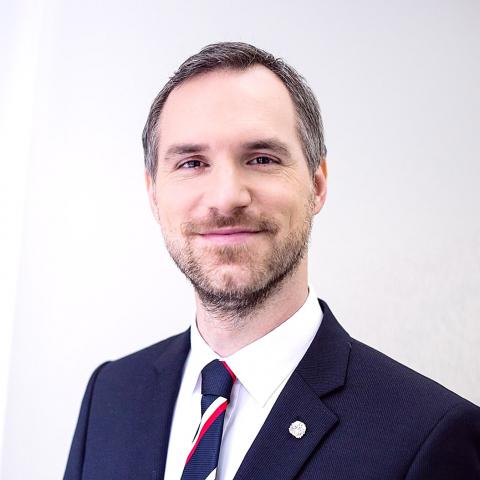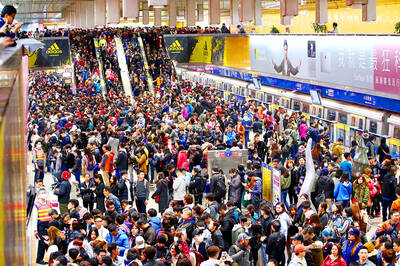Zdenek Hrib had been Prague’s mayor for little more than a month when he went face-to-face with the Czech capital’s complex entanglement with China.
Hosting a meeting with foreign diplomats in the city, Hrib was asked by the Chinese ambassador to expel their Taiwanese counterpart from the gathering in deference to Beijing’s “one China” principle.
Given Chinese investments in the Czech Republic — including the acquisition of soccer club Slavia Prague, a major brewery and a stake in a private TV station — the fledgling mayor could have easily agreed.

Photo: Screen grab from Facebook
The Prague City Council had, under his predecessor, signed a twin cities agreement with Beijing that explicitly recognized the “one China” principle.
Instead, Hrib refused and the Taiwanese diplomat stayed.
The episode was a rare case of a local politician defying the might of a global superpower while making a principled stand against a national government policy that has promoted Chinese ties.
Hrib’s conduct has invited comparison with former Gdansk mayor Pawel Adamowicz, after whom he renamed a Prague street following Adamowicz’s murder in January.
Adamowicz offered his city as a haven for refugees and adopted liberal positions at odds with the policies of Poland’s conservative Law and Justice Party government.
Hrib has since gone further, demanding that Beijing officials drop the clause stating Prague’s support for the “one China” principle in the 2016 deal and threatening to scrap the arrangement if they refuse.
“This article is a one-sided declaration that Prague agrees with and respects the ‘one China’ principle and such a statement has no place in the sister cities agreement,” Hrib said in an interview in Prague’s new town hall, close to the city’s historic tourist district, which has drawn an increasing number of visitors from China.
“The ‘one China’ principle is a complicated matter of foreign politics between two countries, but we are solving our sister cities relationship on the level of two capital cities,” he added.
Hrib, a 38-year-old doctor who spent a medical training internship in Taiwan, is challenging Czech President Milos Zeman, who has visited China several times, installed a Chinese adviser at his office in Prague Castle and declared that he wanted to learn “how to stabilize society” from China’s communist rulers.
The dispute has catapulted unassuming Hrib to household name status in Czech politics, helped by Prague’s position as an international cultural draw and its outsize share of national resources.
Hrib’s rise from obscurity is striking because Czech mayors are not directly elected.
He became mayor of a coalition administration after his Czech Pirate Party, a liberal group with roots in civil society, finished second in municipal elections in October last year.
Hrib has said that he is merely adopting the policy of his party and its two coalition partners in taking decisions that are cooling Prague’s relations with Beijing.
In March, his administration restored the practice of flying the Tibetan flag from Prague’s town hall, reinstating a tradition begun in the era of the Czech Republic’s first post-communist president, Vaclav Havel, which was dropped by the previous city administration.
At the same time, in a move tailor-made to infuriate Beijing, Hrib hosted the visiting head of Tibet’s government-in-exile, Lobsang Sangay.
An official visit to Taipei followed, during which Hrib criticized China for harvesting organs from political prisoners belonging to the Falun Gong movement.
Threats of retaliation came soon afterward.
A planned tour of China by the Prague Philharmonia in September is in jeopardy after it rebuffed Beijing’s demands to repudiate the mayor.
Orchestra spokeswoman Iva Nevoralova likened the request to the actions of Czechoslovakia’s former communist regime, which pressured artists to denounce Havel’s dissident Charter 77 movement as the price for being allowed to perform.
Speaking to the Guardian, Hrib questioned whether Prague’s arrangement with Beijing was a fair relationship and criticized China’s “social scoring” system for good citizenship.
He suggested that investment from Taiwan, with its Western-style democracy and record of technological innovation, offered greater benefit.
The mayor has won praise for restoring the Czech Republic’s image as a champion of human rights and self-determination at a time when its politics have been dominated by the populist messages of Zeman and Czech Prime Minister Andrej Babis, an anti-immigration billionaire.
“It is empowering to see that a mayor of Prague can have a principled position, despite large portions of the Czech political establishment being co-opted by the narratives spread by the totalitarian government of China,” said Jakub Janda, executive director of the European Values think tank, which monitors anti-Western influence in Czech politics and beyond.
Jiri Pehe, the director of New York University in Prague, said that Hrib was using the mayor’s office to reassert the values of Havel, who died in 2011.
“Everyone in this country knows that when you support Taiwan and Tibet, you’re saying exactly what Havel used to say,” Pehe said. “This was intentional on the part of the Pirate party as soon as he took over Prague. They are saying that the Czech Republic has a special history of fighting against communism and you should respect it.”

People can take the Taipei MRT free of charge if they access it at Nanjing Sanmin Station or Taipei Arena Station on the Green Line between 12am and 6am on Jan. 1, the Taipei Department of Transportation said on Friday, outlining its plans to ease crowding during New Year’s events in the capital. More than 200,000 people are expected to attend New Year’s Eve events in Taipei, with singer A-mei (張惠妹) performing at the Taipei Dome and the city government’s New Year’s Eve party at Taipei City Hall Plaza, the department said. As people have tended to use the MRT’s Blue or

Civil society groups yesterday protested outside the Legislative Yuan, decrying Chinese Nationalist Party (KMT) efforts to pass three major bills that they said would seriously harm Taiwan’s democracy, and called to oust KMT caucus whip Fu Kun-chi (傅?萁). It was the second night of the three-day “Bluebird wintertime action” protests in Taipei, with organizers announcing that 8,000 people attended. Organized by Taiwan Citizen Front, the Economic Democracy Union (EDU) and a coalition of civil groups, about 6,000 people began a demonstration in front of KMT party headquarters in Taipei on Wednesday, organizers said. For the third day, the organizers asked people to assemble

Taipei is participating in Osaka’s Festival of Lights this year, with a 3m-tall bubble tea light installation symbolizing Taiwan’s bubble tea culture. The installation is designed as a bubble tea cup and features illustrations of Taipei’s iconic landmarks, such as Taipei 101, the Red House and North Gate, as well as soup dumplings and the matchmaking deity the Old Man Under the Moon (月下老人), affectionately known as Yue Lao (月老). Taipei and Osaka have collaborated closely on tourism and culture since Taipei first participated in the festival in 2018, the Taipei City Department of Information and Tourism said. In February, Osaka represented

Taiwanese professional baseball should update sports stadiums and boost engagement to enhance fans’ experience, Chinese Professional Baseball League (CPBL) commissioner Tsai Chi-chang (蔡其昌) told the Liberty Times (sister paper of the Taipei Times) in an interview on Friday. The league has urged Farglory Group and the Taipei City Government to improve the Taipei Dome’s outdated equipment, including relatively rudimentary television and sound systems, and poor technology, he said. The Tokyo Dome has markedly better television and sound systems, despite being 30 years old, because its managers continually upgraded its equipment, Tsai said. In contrast, the Taipei Dome lacked even a room for referees